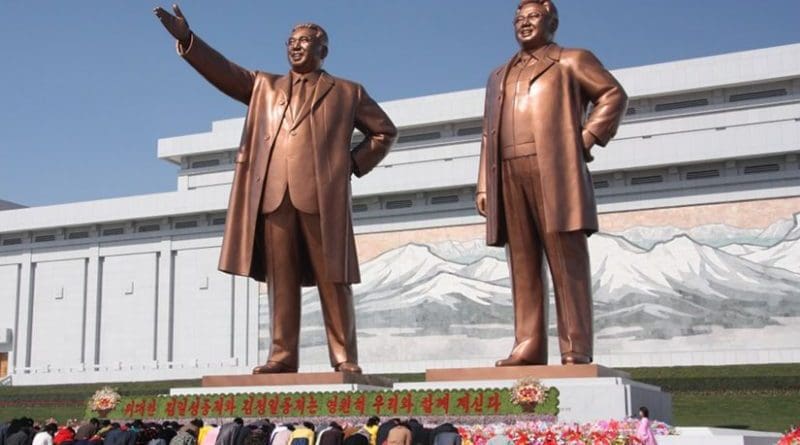North Korea’s Nuclear Test Escalates Military Tensions – Analysis
By IDN
By Rodney Reynolds
As military tensions continue to rise between two of the world’s major nuclear powers – the United States and Russia – the United Nations remains strongly committed towards one of its longstanding goals: a world without nuclear weapons.
But North Korea’s announcement of its first hydrogen bomb – tested January 4 – is threatening to escalate the nuclear challenge even further.
The 193-member General Assembly wrapped up its 2015 sessions in December adopting 57 draft resolutions on arms control and disarmament – 23 of which were on nuclear weapons.
In one of the resolutions, urging all member states not to carry out nuclear weapon test explosions, there were 181 countries voting in favour, with only one vote (North Korea) against it.
In a statement released January 6, Secretary-General Ban Ki-moon said the underground nuclear test announced by the Democratic People’s Republic of Korea (DPRK) on January 6 is deeply troubling.
“This test once again violates numerous Security Council resolutions despite the united call by the international community to cease such activities. It is also a grave contravention of the international norm against nuclear testing. ”
He said this act is profoundly destabilising for regional security and seriously undermines international non-proliferation efforts. “I condemn it unequivocally. And I demand the DPRK cease any further nuclear activities and meet its obligations for verifiable denuclearization.”
“We are monitoring and assessing developments in close coordination with the concerned international organisations – including the Comprehensive Nuclear-Test-Ban Treaty Organization – and interested parties,” Ban added.
Asked if these resolutions carry any political clout, Ray Acheson, Director of Reaching Critical Will, told IDN many General Assembly (GA) resolutions are repetitive and are more oriented towards reiterating common positions than advancing concrete progress.
However the GA adopted several new, important texts, she added.
Acheson pointed out that 138 states voted in favour of an open-ended working group on nuclear disarmament that will be open to all but blockable by none.
The states participating in this working group next year should use it to discuss elements for a new legal instrument to prohibit nuclear weapons. The support for this resolution clearly shows that states are ready to make tangible progress in this regard, Acheson said.
She said the resolutions on the humanitarian consequences of nuclear weapons, humanitarian pledge for the prohibition and elimination of nuclear weapons, and ethical imperatives for a nuclear weapon free world were also adopted, not only by a majority, but by two-thirds of UN member states.
It would appear that a great number of states are ready to finally stand up to the nuclear-armed countries and their nuclear allies and take concerted action for nuclear disarmament, said Acheson who monitors and analyses international processes related to disarmament and arms control.
But even as anti-nuclear activists were warning of a rising nuclear threat, North Korea justified its detonation of the hydrogen bomb as “a self defensive measure to defend our right to live in the face of nuclear threats and blackmail by the United States and to guarantee the security of the Korean peninsula.”
Responding to the North Korean test, Beatrice Fihn, Executive Director of the International Campaign to Abolish Nuclear Weapons (ICAN), said escalating tensions between nuclear armed states is raising concerns about a new arms race.
But unlike the Cold War, she said, this time it would involve a larger number of actors and unstable and volatile regions.
“The risk of use or accident involving nuclear weapons is on the rise,” she warned.
In a statement released January 6, ICAN said nuclear weapons are irresponsible means of warfare and their use and possession is a ruthless act that must be condemned by the international community as a whole.
Condemnation must be followed by the development of an international prohibition on nuclear weapons similar to the bans on chemical and biological weapons.
In February 2016 member states will meet in Geneva to conduct talks to develop new law on nuclear weapons.
“All responsible states should negotiate new law on nuclear weapons, take a clear stand against the possession and reliance on this weapon of mass destruction and develop an unambiguous prohibition of nuclear weapons” Fihn added.
Referring to the General Assembly resolutions adopted last month, Acheson told IDN that in voting for the resolution on the ethical imperatives for a nuclear weapon free world, 132 states agreed that nuclear weapons “undermine collective security, heighten the risk of nuclear catastrophe, aggravate international tension and make conflict more dangerous.”
In voting for another resolution reflecting the humanitarian pledge for the prohibition and elimination of nuclear weapons, 139 states called on all relevant stakeholders to “stigmatize, prohibit and eliminate nuclear weapons in the light of their unacceptable humanitarian consequences and associated risks.”
“These are important positions for states to take at the GA,” she added.

